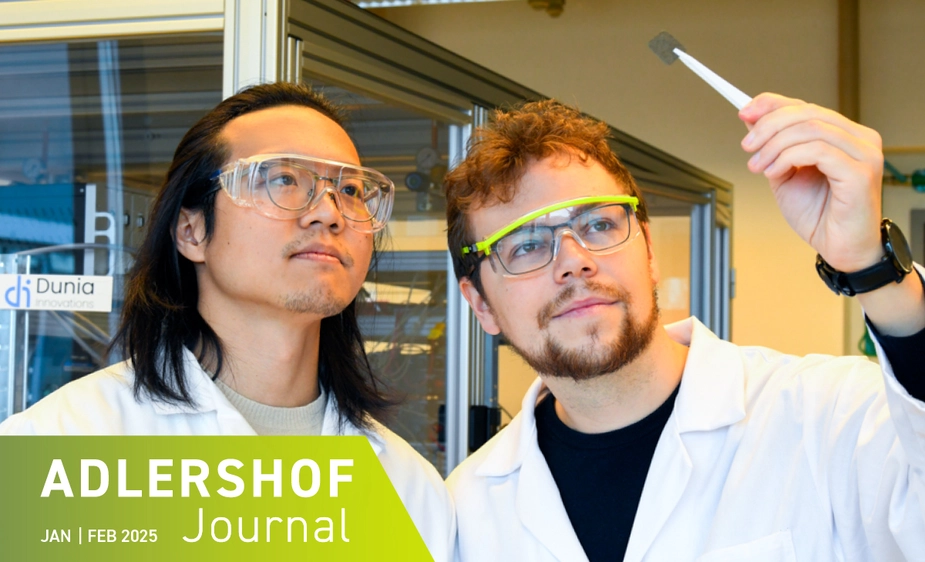Developing catalysts with robots and AI
Dunia wants to protect Earth from its increasing destruction

The Adlershof-based start-up Dunia has established a highly systematic approach to material development. A self-repeating cycle in four steps: Design – Make – Test – Analyse. What sets Dunia's approach apart is the time at which the team—now grown to 14 smart minds—introduces robots to the process. While others begin automation at the transition to mass production, the founders Marcus Tze-Kiat Ng, Ahmed Ismail and Alexander Hammer integrate this step already into quality assurance. In their AI-driven search for optimal catalysts, they leave nothing to chance. Reliability, scalability, and stability are the essentials for using catalysts on an industrial scale. To this aim, the robots apply the newly designed materials to test surfaces at the nano and micrometre scale— a reproducible process that would produce too much variability if performed manually, thereby compromising the test results. ‘We ensure maximum comparability between the materials and their respective catalytic efficiencies,’ explains Tze-Kiat Ng.
It is precisely those efficiencies that are critical if their ambitious plan is to succeed. Dunia is Arabic for Earth. Chemistry, on the other hand, is often uttered in the same breath as environmental destruction and climate-damaging practices. The team at Dunia, however, relies on chemistry to combat environmental destruction and climate change. Specifically, they focus on catalysts. The better the catalysts, the less energy is required to initiate chemical reactions. ‘If we can lower the energy barrier with efficient catalysts, processes that currently take years or demand vast amounts of energy will be reduced to a matter of seconds,’ says Hammer. Water electrolysis to produce hydrogen, synthesising ammonia from nitrogen, or converting the greenhouse gas CO₂ into long-chain hydrocarbons—these are energy-intensive processes whose commercial viability often fails due to inefficiencies. ‘We want to change this and, among other things, develop the world’s first cost-efficient CO₂ electrolyser,’ adds Ismail, the team’s third member. They have also set their sights on photovoltaics, battery, and fuel cell production.
To found their business, they came to Berlin from Glasgow two and a half years ago. The trio, with roots in three countries on three continents—Malaysia, Egypt, and Germany—met at university and while completing their PhDs. Through study visits in France, China, the UK, the Netherlands, and the US, they built a global network that now supports them in finding highly qualified professionals. The neighbouring universities and research institutes in Adlershof also play a key role. ‘More so because Berlin is a hotspot for materials science,’ says Tze-Kiat Ng. Additionally, the city is so attractive that specialists from around the world are eager to live and work here. And they received a start-up grant with free laboratory access in the founding phase. It was this complete package that made Berlin more appealing than London and other potential locations.
In fact, every continent, except Australia, is represented on the team. The professional backgrounds among them are equally diverse, ranging from former top managers at General Electric to PhD researchers, career starters, and student assistants. ‘Physics-informed machine learning’ is what they call their technology of algorithms trained with know-how from material science, physics and chemistry. With it, the team has secured 11.5 million euros in venture capital and a 2.5 million grant from the European Commission’s EIC Accelerator programme. This success is also due to the fact that catalytic materials represent a growing market, valued at 35 billion euros by 2030. Those who take risks and win in this field stand to win big. ‘That’s attractive to investors,’ says Hammer, ‘and, in our case, it would also be a huge step towards mitigating climate change and preserving our habitat on Earth.’
Peter Trechow for Adlershof Journal